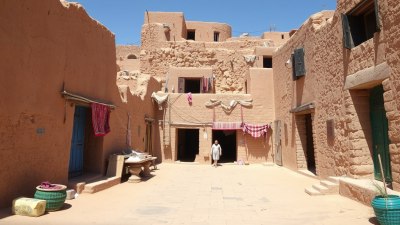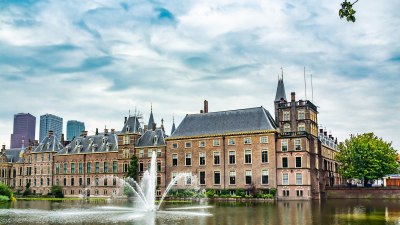The Desert Remembers in Ghardaïa, Algeria
Explore the rich history and culture of Ghardaïa, Algeria, where the desert holds memories of a vibrant past.

Image created with Flux Schnell
Ghardaïa, located in the M'zab Valley of Algeria, is a UNESCO World Heritage site that encapsulates a unique cultural tapestry woven by the desert and its people. The history of this region is as intricate as the patterns found in the traditional carpets crafted by the locals. To understand why the desert remembers, one must embark on a journey through its historical landscapes, architectural marvels, and vibrant traditions.
The origins of Ghardaïa date back to the 10th century when the Mozabite Berbers established the city as a crucial trade route across the Sahara. The strategic location enabled it to flourish as a hub for commerce and cultural exchange. The architecture of Ghardaïa is distinctively adapted to the harsh desert climate. The use of mud-bricks, narrow alleys, and thick walls reflects a profound understanding of environmental sustainability. As one strolls through its winding streets, it is hard not to feel the echoes of ancient traders bustling about, trading spices, textiles, and salt.
The Dziriya mosque, a centerpiece of Ghardaïa, showcases the rich Islamic heritage of the area. Its towering minaret and intricately designed cedar doors draw visitors from around the world, all eager to soak in the spirituality that permeates the air. Surrounding the mosque are the vibrant souks, where one can find artisans painstakingly handcrafting goods – from traditional attire to exquisite jewelry embedded with semi-precious stones. These markets are a testament to the skills passed down through generations, preserving the artistry of a people who have thrived in an unforgiving environment.
The M'zab Valley
The M'zab Valley, where Ghardaïa is situated, presents a remarkable landscape marked by palm groves, rocky outcrops, and expansive dunes. Its unique geography has shaped not only the lifestyle of its inhabitants but also their worldview. For the Mozabite people, the desert is more than just a backdrop; it is a living entity that shapes their identity and traditions. The residents have developed a relationship with the land characterized by respect and reverence, leading to practices that promote sustainability, such as rainwater harvesting and communal farming.
A key cultural event is the return of the date harvest, celebrated annually with great fervor. The date palms, which dot the landscape, are a significant source of both nutrition and livelihood for the local communities. The harvest draws families together, and the process becomes a festive occasion, marked by laughter, storytelling, and music. It is during these moments that the desert truly remembers, as tales of struggle, resilience, and connection to the land are passed down to younger generations.
Social Structure and Traditions
The society in Ghardaïa is deeply hierarchical and organized around the principles of solidarity and cooperation. Each family unit plays a vital role, and the community looks after its members through various forms of social support. Marriages are often arranged, ensuring the preservation of familial ties and cultural heritage. Traditional dances and music, accompanied by instruments such as the guembri (a three-stringed bass) and the bendir (a framed drum), reflect the joyful celebrations that accompany weddings and other significant life events.
The role of women in Ghardaïa is particularly noteworthy. While they traditionally held the responsibility of managing the home, women are increasingly becoming empowered through education and entrepreneurship. Crafts and trades that were once male-dominated are now seeing the emergence of female artisans who create stunning jewelry and textiles. This gradual shift is indicative of the evolving societal norms while still maintaining the fabric of their rich cultural heritage.
The Culinary Heritage
No exploration of Ghardaïa would be complete without indulging in its culinary delights. The cuisine here reflects the influence of Berber, Arab, and even Saharan flavors. A staple food is couscous, often served with a variety of meats and vegetables. Tagine, a slow-cooked dish, is also popular, prepared with local spices that create rich, aromatic dishes.
Another significant delicacy is the 'makroud,' a date-filled pastry that embodies the spirit of camaraderie as it is often shared during holidays and gatherings. Festivals provide an opportunity for celebrating culinary traditions, where families come together to prepare communal meals, reinforcing social bonds and collective memories.
Challenges and Future Prospects
Tourism, too, has become a double-edged sword. While it brings much-needed economic support, it can also pose a risk to the preservation of cultural sites and traditions. Balancing growth with conservation is essential for the future of Ghardaïa. Developing eco-tourism initiatives that respect the local culture and environment can provide sustainable pathways for economic development.
In Ghardaïa, Algeria, the desert indeed remembers. It remembers the stories of its people, the dances of its traditions, and the laughter that echoes through the palm groves. As the world evolves, the spirit of Ghardaïa remains steadfast, anchored in a heritage that continues to inspire respect for the past while adapting to the future. The tales of this ancient city serve not just as a reminder of where we come from but also a guiding light toward a sustainable and inclusive future.











